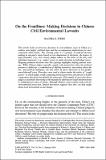|
Reseña:
|
This article looks at forty-two decisions in civil pollution cases in China as a window onto judges’ political logic and the accompanying implications for envi- ronmental enforcement. The starting point is a typology of judicial decision making in one-party states based on two dimensions of decisions: the degree of legal formality (e.g., how closely judges adhere to the letter of the law) and individual autonomy (e.g., judges’ power to make decisions in individual cases). Mapping pollution decisions onto this typology highlights shifting judicial strat- egy. While Chinese judges typically comply with instructions when the political pressure is dialed up, a combination of shifting incentives, uncertainty about the law, and political ambiguity can also allow de facto discretion in low-profile, run-of-the-mill cases. Everyday cases tend to cluster under the rubric of “rough justice” in which judges weigh competing political priorities and aim for a livable compromise that dents but upholds the status quo. This sample of cases also shows judges occasionally innovating at the margins by offering new legal interpretations or validating new types of claims. Although Chinese courts remain weak tools for environmental protection, limited innovation suggests that they can help nudge along local incremental social change. |

